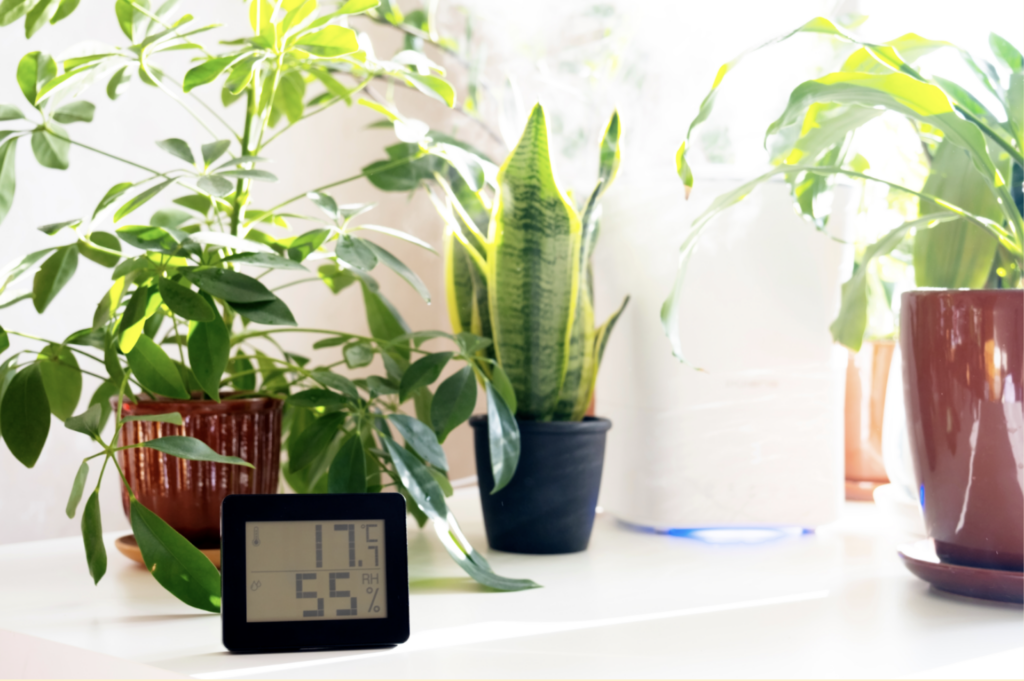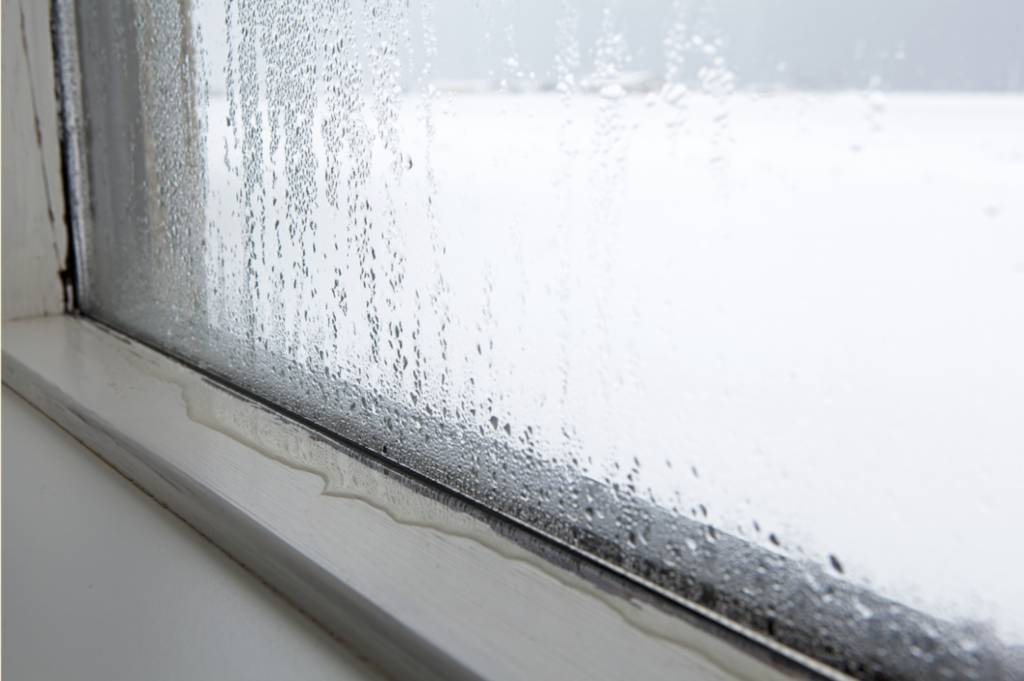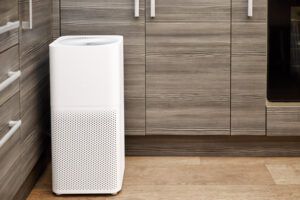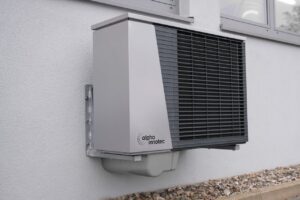Have you ever felt uncomfortably sticky and sweaty indoors, even when the temperature inside isn’t high? That’s likely due to high humidity levels in your home. While air conditioning is often associated with cooling down a space, it also plays a significant role in reducing indoor humidity. In this blog post, we’ll dive into the world of air conditioning and humidity, answering your questions about:
- How air conditioners work
- How they affect humidity levels
- How to measure humidity in your home
- Effective ways to reduce indoor humidity
- When to seek professional help from Oxbow HVAC contractors in Gresham
Air Conditioning Basics
An air conditioner functions like a giant sponge, absorbing heat and moisture from your indoor air. Here’s a simplified breakdown of the process:
- Warm air enters the system: Air from your home is drawn into the air conditioning unit through vents.
- Cooling through refrigerant: This warm air passes over evaporator coils containing a cool refrigerant. The air absorbs the coolness, lowering its temperature.
- Moisture condensation: As the air cools, it loses its ability to hold as much moisture. This excess moisture condenses on the cold evaporator coils, forming water droplets.
- Drainage and cooled air circulation: The system collects condensed water, which then drips into a drain pan and is removed from your home. The system circulates the cooled, dehumidified air back into your living space through vents.
Does Air Conditioning Lower Humidity?
The short answer is yes, air conditioning can help reduce humidity. As we saw in the process explained earlier, air conditioners remove moisture from the air during the cooling process. However, it’s important to understand that reducing humidity is not the primary function of air conditioners. Air conditioners are designed to cool your home, and reducing humidity is a secondary benefit.
In addition, the efficiency of your air conditioning lowering humidity can vary. The effectiveness of air conditioning in reducing humidity depends on several factors, including the initial humidity level, the size and capacity of your AC unit, and how long it runs.
How Can You Check Humidity in Your Home?
Knowing your home’s humidity level is crucial for determining if you need to take steps to reduce it. Ideally, your home’s humidity should be between 30% and 50%. Levels below 30% can cause dry skin and respiratory irritation. Levels above 50% can promote mold growth and feel muggy.
We recommend these two easy ways to measure humidity in your home:
- Using a Hygrometer: This is a small, affordable device that measures the humidity in your home. Place it in a central location and monitor the readings throughout the day.
- Smart Thermostats: Some advanced thermostats come with built-in humidity sensors that display the current humidity level along with the temperature.

Steps to Reduce Indoor Humidity
Here are several effective strategies you can implement to lower humidity in your Gresham home:Ventilation
- Open windows and doors when the weather is nice. This will let fresh air in and replace the humid air inside your home. This is most effective on dry, breezy days.
- Use exhaust fans in your kitchen and bathroom while showering, cooking, or doing laundry. These fans help remove moisture generated during these activities from your home.
Dehumidifiers
If your air conditioner struggles to maintain comfortable humidity levels, consider using a dehumidifier. These appliances are specifically designed to extract moisture from the air, offering more precise control over humidity levels.Change Air Filters Regularly
A clogged air filter can restrict airflow and hinder the system’s ability to remove moisture effectively. Changing your filter regularly ensures optimal performance. We recommend replacing your air filter monthly.Set AC Fan to Auto
Adjust your air conditioner fan setting to “auto” instead of “on”. This allows the fan to run only when the compressor is working to cool the air. This helps prevent the re-circulation of already dehumidified air, improving efficiency.Don’t Leave Standing Water
Standing water in your home, like leaky faucets or condensation on pipes, can contribute to increased humidity levels. Fix leaks and wipe up spills as soon as possible.
Use Bathroom & Kitchen Vents
As mentioned earlier, using exhaust fans in these rooms removes moisture at the source, reducing the overall humidity burden on your air conditioner.Check HVAC System
Book regular AC maintenance with Oxbow HVAC to keep your air conditioning system running smoothly and removing moisture effectively. Regular maintenance by a qualified Oxbow HVAC technician in Gresham can include:- Evaporator coils: Cleaning dirty evaporator coils improves their ability to absorb moisture and cool the air.
- Refrigerant line charge: Checking and adjusting the refrigerant charge ensures the system operates at optimal efficiency, impacting both cooling and dehumidification capabilities.
High Indoor Humidity Impact on Air Conditioning Units
While air conditioners can help reduce humidity, excessively high humidity levels can actually harm your AC unit. When humidity is high, the air conditioner has to work harder to cool the air and remove moisture. This can lead to increased wear and tear on the system, potentially shortening its lifespan.
High humidity can make evaporator coils freeze, stopping the system from working well.
High Indoor Humidity Impact on Health
Beyond comfort and the health of your air conditioning system, high indoor humidity can also impact your health. Here are some potential consequences:
- High humidity leads to mold and mildew growth, causing allergies and breathing issues.
- Dust mites thrive in humid environments, and their allergens can exacerbate asthma and allergy symptoms.
- Studies have shown that high humidity can increase the risk of respiratory infections. This is especially true for young children and those with existing respiratory conditions.
Manage Indoor Humidity with Expert HVAC Contractors at Oxbow
Maintaining comfortable and healthy humidity levels in your Gresham home is important for your comfort, the well-being of your air conditioner, and your overall health. While air conditioning can help reduce humidity, it’s important to understand its limitations and implement other strategies like ventilation, dehumidifiers, and proper maintenance.
If you’re struggling to control humidity in your home or think your air conditioner might not be functioning properly, don’t hesitate to contact Oxbow HVAC contractors. Our team can:
- Assess your specific humidity control needs
- Recommend and implement effective solutions
- Perform routine maintenance to ensure your air conditioner operates efficiently
Schedule an appointment with Oxbow HVAC today and breathe easy in your comfortable, healthy Gresham home. We offer 24/7 support to provide you the best service any time of day.
Assessing the effectiveness of your air conditioner in reducing humidity can be done by monitoring the humidity levels in your home using a hygrometer or a smart thermostat. Regularly checking these devices and comparing the readings to the recommended humidity range of 30% to 50% will help determine if your air conditioner is maintaining optimal levels.
While using a dehumidifier alongside an air conditioning unit can provide more precise control over indoor humidity levels, there are potential drawbacks to consider. One possible side effect is increased energy consumption, as running both appliances simultaneously may result in higher electricity bills. Additionally, improper placement or sizing of the dehumidifier relative to the space it's intended to serve could lead to inefficiencies or uneven moisture removal.
Excessively low humidity levels indoors can indeed pose health risks, such as dry skin, irritated respiratory passages, and increased susceptibility to respiratory infections. To prevent these issues, it's essential to strike a balance between humidity levels that are too high and those that are too low. Utilizing a hygrometer to monitor humidity and implementing strategies such as using humidifiers, especially during dry seasons, can help maintain a healthy indoor environment.







